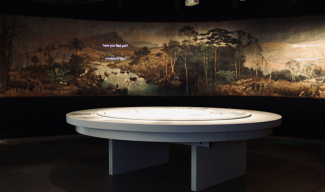
Het Congopanorama 1913. Koloniale illusie doorprikt
Wat schuilt er achter jouw scherm?
Vanaf 28 november 2025OPENINGSUREN
- Openingsuren:
- Dinsdag - vrijdag: 10 - 17 u.
Weekend: 10 - 18 u. - Gesloten op maandag, 1 januari, 1 mei en 25 december


Instaprondleiding
Keer mee terug naar het jaar 1913 en ontdek het Congopanorama, een monumentaal kunstwerk dat duizenden bezoekers betoverde op de Wereldtentoonstelling in Gent.
MEER INFORMATIE



